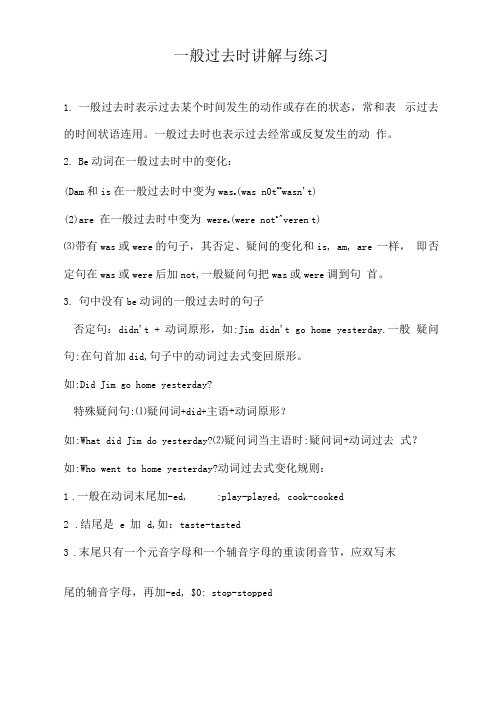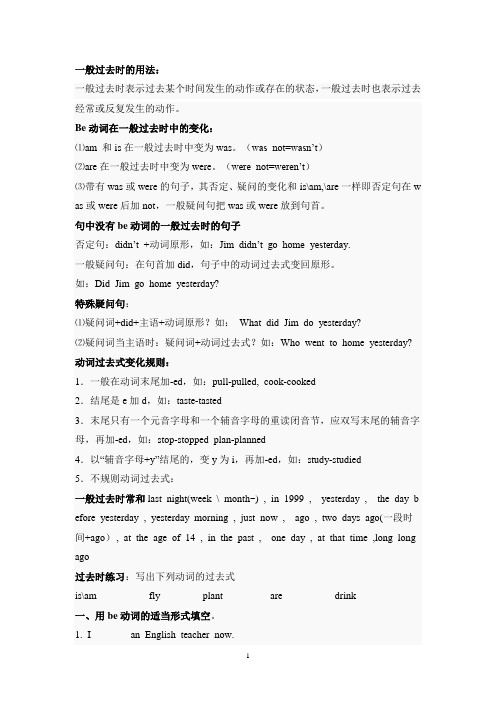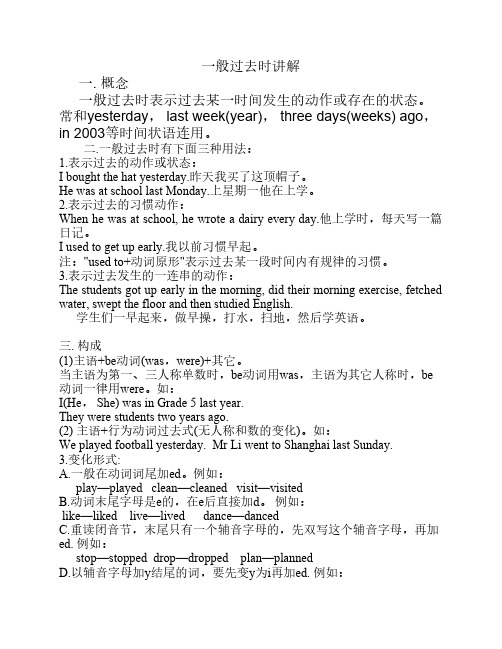小学六年级英语毕业复习资料【一般过去时的用法】
(word完整版)小学六年级_一般过去式_语法讲解

一,概念表示在过去某个时间里所发生的动作或存在的状态。
通常在句子里找到表示过去时间的词或词组。
如:yesterday, yesterday morning, yesterday afternoon, yesterday evening, the day before yesterday, last night, last week, last month, last year, a moment ago, just now, two days ago, a week ago, in 1990等。
如:I went to bed at eleven last night. 昨晚我11:00睡觉。
二动词过去式的构成规律(一)规则动词的过去式1,一般情况下+,在动词原形后面加-ed;Look--- looked play----played start--- started visit—visited2, 以不发音e结尾的动词,在词尾直接加-d;Live—lived use---used3, 以“辅音字母+y”结尾的动词,先将y 改成i,再加–ed;Study---studied try—tried fly---flied4,以重读闭音节(即辅音+元音+辅音)或 r 音节结尾,末尾只有一个辅音字母的动词,要先双写这个辅音字母后,再加–ed。
Stop---stopped plan---planned preferred(二)不规则动词的过去式1 改变动词中的元音;Begin--- began drink---drank come---came eat---ateGrow---grew run---ran know---knew win---won speak---spokeTake ---took write ---wrote get---got2 变词尾的-d 为-tBuild---built lend---lent send---sent spend--spent bend--bent3 与动词原形一样;Cut---cut put---put cost----cost hurt---hurt shut---shut4 变-ay 为—aid(少数动词)Say---said pay---paid lay---laid5 采用不同词根;Sell--- sold teach----taught buy----bought6 其他Am/is ---was are---were have/has--- had do---did二加–ed 后的读音方法1 ed加在清辅音后面读/t/Finished/-t/ help /-t/ asked/-t/2 ed 加在浊辅音或元音结尾的,读/d/Played/-d/ lived/-d/ enjoyed/-d/3 ed 加在/t/或/d/后面,读/id/Wanted /-tid/ needed/-did/ visited /-tid/过去时练习:写出下列动词的过去式Is\am______ fly___ plant_____ are_____ drink_____Play ______ go____ make______ does_____ dance_____Worry______ ask____ taste_______ eat_____ draw_____Put_____ throw______ kick_______ pass_____ do______用所给动词的适当形式填空1 We_____ (live) in Japan last year.2 Susan_____(stop) the car on the street yesterday.3 My mother____(clean) my room and I _____( study) for the English test last Sunday.4 What____ you_____(do) last night?5 On Saturday morning I ____(play) football二用括号内所给动词的适当形式填空(1)May_____(finish) her homework very late yesterday evening.(2)Han Mei_____(bring) her pet to the park that day.(3)His father______(buy) a new computer for him last week(4)Miss Du______ (walk) to work every day last term.(5)We____(move) to Shenyang 8 years ago.(6)_____ you _________(have) bread for breakfast this morning?(7)She_______(give) me a nice present last night.(8)The police______(stop) the car and_____(catch) the thief (小偷) just now.(9)Tom ____(carry)water for the old man last Saturday.(10)Uncle Wang______(come)into the room and______(find) something to eat.(11)Lily______(study)in the classroom for two hours and then ____(leave).(12)Jimmy______(do) a lot today. He______(go) shopping and _____(cook)supper.(13)We_____(go) to the cinema last night. The film_____(be)very good.(14)What time ______you________(get) to school this morning?三句子变化(一)一般过去时的一般疑问句1.把 was, were放在句首,其余位置不变。
小学六年级英语语法复习要点讲解和练习 一般过去时

小学六年级英语语法复习要点讲解和练习一般过去时[标签:小学英语语法]一般过去时一.一般过去时示意过去某个时候产生的动作或存在的状况,常和示意过去的时候状语连用。
一般过去时也示意过去常常或频频产生的动作感谢。
二.Be动词在一般过去时中的变化:⑴am 和is在一般过去时中变成was。
(was not=wasn’t)⑵are在一般过去时中变成were。
(were not=weren’t)⑶带有was或were的句子,其否定、疑难...一般过去时一.一般过去时示意过去某个时候产生的动作或存在的状况,常和示意过去的时候状语连用。
一般过去时也示意过去常常或频频产生的动作感谢。
二.Be动词在一般过去时中的变化:⑴am 和is在一般过去时中变成was。
(was not=wasn’t)⑵are在一般过去时中变成were。
(were not=weren’t)⑶带有was或were的句子,其否定、疑难的变化和is, am, are同样,即否定句在was 或were后加not,一样平常疑问句把was或were调到句首。
三.句中没有be动词的一般过去时的句子否定句:didn’t +动词本相,如:Jim didn’t go home yesterday.一样平常疑问句:在句首加did,句子中的动词过去式变回本相。
如:Did Jim go home yesterday?特别疑问句:⑴疑问词+did+主语+动词本相?如:What did Jim do yesterday?⑵疑问词当主语时:疑问词+动词过去式?如:Who went to home yesterday?动词过去式变化规则:一.一样平常在动词末端加-ed,如:pull-pulled, cook-cooked二.结尾是e加d,如:taste-tasted三.末端只有一个元音字母和一个辅音字母的重读闭音节,应双写末端的辅音字母,再加-ed,如:stop-stopped四.以“辅音字母+y”结尾的,变y为i,再加-ed,如:study-studied过去时实习写出以下动词的过去式is\am_________ fly_______ plant________ are ________drink_________ play_______ go________ make ________does_________ dance________ worry________ ask _____taste_________ eat__________ draw________ put ______throw________ kick_________ pass_______ do ________Be动词的过去时实习(一)1、用be动词的适量情势填空1. I _______ at school just now.2. He ________ at the camp last week.3. We ________ students two years ago.4. They ________ on the farm a moment ago.5. Yang Ling ________ eleven years old last year.6. There ________ an apple on the plate yesterday.7. There ________ some milk in the fridge on Sunday.8. The mobile phone _______ on the sofa yesterday evening.2、句型转换1. It was exciting.否定句:________________________________________________一样平常疑问句:____________________________________________ 肯、否定回答:__________________________________________2. All the students were very excited.否定句:________________________________________________ 一样平常疑问句:____________________________________________ 肯、否定回答:__________________________________________3. They were in his pocket.否定句:________________________________________________ 一样平常疑问句:____________________________________________ 肯、否定回答:__________________________________________。
六年级英语一般过去时讲解与练习(最新整理)

一般过去时讲解与练习1.一般过去时表示过去某个时间发生的动作或存在的状态,常和表示过去的时间状语连用。
一般过去时也表示过去经常或反复发生的动作。
2.Be动词在一般过去时中的变化:(Dam和is在一般过去时中变为was o(was n0t zz wasn't)(2)are 在一般过去时中变为were o(were not z^veren,t)⑶带有was或were的句子,其否定、疑问的变化和is, am, are 一样,即否定句在was或were后加not,一般疑问句把was或were调到句首。
3.句中没有be动词的一般过去时的句子否定句:didn't + 动词原形,如:Jim didn't go home yesterday.一般疑问句:在句首加did,句子中的动词过去式变回原形。
如:Did Jim go home yesterday?特殊疑问句:⑴疑问词+did+主语+动词原形?如:What did Jim do yesterday?⑵疑问词当主语时:疑问词+动词过去式?如:Who went to home yesterday?动词过去式变化规则:1.一般在动词末尾加-ed, :play-played, cook-cooked2.结尾是 e 加d,如:taste-tasted3.末尾只有一个元音字母和一个辅音字母的重读闭音节,应双写末尾的辅音字母,再加-ed, $0: stop-stopped4.以“辅音字母+y”结尾的,变y为i,再加-ed,如:study-studied5.小学常用不规则动词过去式:am,is-was, are-were, do-did, see-saw, say-said, give-gave, get-got, go- went, come-came, have-had, eat-ate, take-took, run-ran, sing-sang, put- put, make-made, read-read, write-wrote, draw-drew, drink-drank, fly- flew, ride-rode, speak-spoke, sweep-swept, swim-swam, sit-sat一.用be动词的适当形式填空1.We students five years ago.2.Patti and I good friends.3.Today Tuesday, Yesterday Monday.4.Sue on the slide a moment ago.5.Where is my hat? It on the desk just now.2.单项选择:从下列各题后所给的四个选项中选择最佳答案填空。
英语人教版六年级下册一般过去时复习

Write your last holiday
要求:语句通顺,书写规范,不少于5句话
2.否定句
(1)主语 + did not / didn’t + 动词原形 + 其他 (2) 主语 + was not / wasn’t + 其他成分 主语 + were not / weren’t + 其他成分
e.g: They played football yesterday.
2.与last 连用
last
3.与yesterday 连用:
Time(上次) night week month year Monday
yesterday
morning afternoon evening
the day before yesterday
4.与that 连用:(了解)
that
Morning(那个早上) Winter(那个冬天)) Day(那天) Year(那年)
Yang Zhuangzi Primary School:Shi Fengdan
一、什么是一般过去时?
意义:动词的一般过去时态表示 过去某个时间发生的动作 或存在的状态。
二、用于一般过去时的时间状语
1.与ago 连用: five days six months four years
ago
long long I saw a film five days ago
注意
1. 加助动词did或者didn’t后,动词 须返回原形。Choose F or T. Did he went to school yesterday? F Did he go to school yesterday?
(完整版)一般过去时时用法及例句

一般过去时的用法:一般过去时表示过去某个时间发生的动作或存在的状态,一般过去时也表示过去经常或反复发生的动作。
Be动词在一般过去时中的变化:⑴am 和is在一般过去时中变为was。
(was not=wasn’t)⑵are在一般过去时中变为were。
(were not=weren’t)⑶带有was或were的句子,其否定、疑问的变化和is\am,\are一样即否定句在w as或were后加not,一般疑问句把was或were放到句首。
句中没有be动词的一般过去时的句子否定句:didn’t +动词原形,如:Jim didn’t go home yesterday.一般疑问句:在句首加did,句子中的动词过去式变回原形。
如:Did Jim go home yesterday?特殊疑问句:⑴疑问词+did+主语+动词原形?如:What did Jim do yesterday?⑵疑问词当主语时:疑问词+动词过去式?如:Who went to home yesterday? 动词过去式变化规则:1.一般在动词末尾加-ed,如:pull-pulled, cook-cooked2.结尾是e加d,如:taste-tasted3.末尾只有一个元音字母和一个辅音字母的重读闭音节,应双写末尾的辅音字母,再加-ed,如:stop-stopped plan-planned4.以“辅音字母+y”结尾的,变y为i,再加-ed,如:study-studied5.不规则动词过去式:一般过去时常和last night(week \ month~) , in 1999 , yesterday , the day b efore yesterday , yesterday morning , just now , ago , two days ago(一段时间+ago), at the age of 14 , in the past , one day , at that time ,long long ago过去时练习:写出下列动词的过去式is\am_________ fly_______ plant________ are ________ drink___一、用be动词的适当形式填空。
一般过去时 六年级英语知识点

一般过去时(小学)一、定义1.表示过去某个时间发生的动作或存在的状态。
如:She ate three apples yesterday. 昨天她吃了三个苹果。
I got up at 6:30 yesterday. 我昨天6:30起床。
My father was very busy last week.我父亲上周很忙。
2.表示过去经常或过去反复发生的动作(也可与often,always等频率副词连用)。
如:He always got up very early when he was young.年轻的时候,他每天总是起得很早。
二、谓语形式:动词的过去式(1)She was a student two years ago. 两年前她是一个学生。
(这件事情已经过去了,所以be动词is要用过去式was)(2)they were students two years ago. 两年前他们/她们是学生。
(这件事情已经过去了,所以be动词are要用过去式were)(3) Ann washed her clothes last night. 安昨晚洗了她的衣服。
(这件事情已经过去了,所以动词wash要用过去式washed)(4) I did my homework promptly. 我及时地完成了作业。
(这件事情已经过去了,所以动词do要用过去式did)三、句子结构:(a) be 动词的过去式句型: (b)动词过去式句型:(a) be 动词的过去式句型:1.肯定句:主语+be 动词(was , were)+其他,如:She was a student two years ago. 两年前她是一个学生。
2.否定句:主语+be not(was not, were not)+其他,如:She was not a student two years ago. 两年前她不是一个学生。
3.一般疑问句:Be动词(Was/Were)+主语+其他?肯定回答为“Yes,主语+was/were”,否定回答为“No,主语+wasn’t/weren’t”。
一般过去时_小学六年级英语

一般过去时讲解一. 概念一般过去时表示过去某一时间发生的动作或存在的状态。
常和yesterday,last week(year),three days(weeks) ago,in 2003等时间状语连用。
二.一般过去时有下面三种用法:1.表示过去的动作或状态:I bought the hat yesterday.昨天我买了这顶帽子。
He was at school last Monday.上星期一他在上学。
2.表示过去的习惯动作:When he was at school, he wrote a dairy every day.他上学时,每天写一篇日记。
I used to get up early.我以前习惯早起。
注:"used to+动词原形"表示过去某一段时间内有规律的习惯。
3.表示过去发生的一连串的动作:The students got up early in the morning, did their morning exercise, fetched water, swept the floor and then studied English.学生们一早起来,做早操,打水,扫地,然后学英语。
三. 构成(1)主语+be动词(was,were)+其它。
当主语为第一、三人称单数时,be动词用was,主语为其它人称时,be动词一律用were。
如:I(He,She) was in Grade 5 last year.They were students two years ago.(2) 主语+行为动词过去式(无人称和数的变化)。
如:We played football yesterday. Mr Li went to Shanghai last Sunday.3.变化形式:A.一般在动词词尾加ed。
例如:play—played clean—cleaned visit—visitedB.动词末尾字母是e的,在e后直接加d。
小学六年级_一般过去式_语法讲解_教案

小学六年级_一般过去式_语法讲解_教案第一篇:小学六年级_一般过去式_语法讲解_教案第一讲过去式一概念表示在过去某个时间里所发生的动作或存在的状态。
通常在句子里找到表示过去时间的词或词组。
如:yesterday, yesterday morning, yesterday afternoon, yesterday evening, the day before yesterday, last night, last week, last month, last year, a moment ago, just now, two days ago, a week ago, in 1990等。
如:I went to bed at eleven last night.昨晚我11:00睡觉。
二动词过去式的构成规律(一)规则动词的过去式1,一般情况下,在动词原形后面加-ed;Look---looked play----played start---started visit—visited 2, 以不发音e结尾的动词,在词尾直接加-d;Live—lived use---used 3, 以“辅音字母+y”结尾的动词,先将y 改成i,再加–ed;Study---studied try—tried fly---flied 4,以重读闭音节(即辅音+元音+辅音)或r 音节结尾,末尾只有一个辅音字母的动词,要先双写这个辅音字母后,再加–ed。
Stop---stopped plan---planned preferred(二)不规则动词的过去式1 改变动词中的元音;Begin---began drink---drank come---came eat---ate Grow---grew run---ran know---knew win---won speak---spoke Take---took write---wrote get---got 2 变词尾的-d 为-t Build---built lend---lent send---sent spend--spent bend--bent 3 与动词原形一样;Cut---cut put---put cost----cost hurt---hurt shut---shut 4 变-ay 为—aid(少数动词)Say---said pay---paid lay---laid采用不同词根;Sell---sold teach----taught buy----bought 6 其他Am/is---was are---were have/has---had do---did二加–ed 后的读音方法 1 ed加在清辅音后面读/t/ Finished/-t/ help /-t/ asked/-t/ 2 ed 加在浊辅音或元音结尾的,读/d/ Played/-d/ lived/-d/ enjoyed/-d/ 3 ed 加在/t/或/d/后面,读/id/ Wanted /-tid/ needed/-did/ visited /-tid/过去时练习:写出下列动词的过去式Isam______ fly___ plant_____ are_____ drink_____ Play ______ go____ make______ does_____ dance_____ Worry______ ask____ taste_______ eat_____ draw_____ Put_____ throw______ kick_______ pass_____ do______ 用所给动词的适当形式填空We_____(live)in Japan last year.2 Susan_____(stop)the car on the street yesterday.3 My mother____(clean)my room and I _____(study)for the English test last Sunday.4 What____ you_____(do)last night? 5 On Saturday morning I ____(play)football 二用括号内所给动词的适当形式填空(1)May_____(finish)her homework very late yesterday evening.(2)Han Mei_____(bring)her pet to the park that day.(3)His father______(buy)a new computer for him last week(4)Miss Du______(walk)to work every day last term.(5)We____(move)to Shenyang 8 years ago.(6)_____ you _________(have)bread for breakfast this morning?(7)She_______(give)me a nice present last night.(8)The police______(stop)the car and_____(catch)the thief(小偷)just now.(9)T om ____(carry)water for the old man last Saturday.(10)Uncle Wang______(come)into the room and______(find)something to eat.(11)Lily______(study)in the classroom for two hours and then ____(leave).(12)Jimmy______(do)a lot today.He______(go)shopping and _____(cook)supper.(13)We_____(go)to the cinema last night.The film_____(be)very good.(14)What time ______you________(get)to school this morning? 三句子变化(一)一般过去时的一般疑问句1.把 was, were放在句首,其余位置不变。
(完整word版)小学六年级英语一般过去时

第十七讲一般过去时一.观点一般过去时表示过去某个时间发生的动作或存在的状态,常和表示过去的时间状语连用。
一般过去时也表示过去常常或频频发生的动作。
例句:1.I watched TV last night.我昨天夜晚看电视。
2.What did you do yesterday?你昨天做了什么?3.They went to Beijing last year.他们昨年去了北京。
二.用法1.表示过去发生的动作或状态,往常会有明确的表示过去的时间状语。
I went to the zoo yesterday.I stayed up last night.2.表达过去连续发生的动作或状态。
This morning , I got up early , went out for a walk , then came back and cooked formy family .3.表示过去某一段不确立的时间内发生的动作或状态。
He worked in the store for 5 years.三. Be 动词在一般过去时中的变化1. am 和 is 在一般过去时中变成was 。
( was not=wasn't)2. are 在一般过去时中变成were 。
( were not=weren't )was 或3.带有 was 或 were 的句子,其否认、疑问的变化和is, am, are 同样,即否认句在were 后加 not ,一般疑问句把was 或 were 调到句首。
四.句中没有be 动词的一般过去时的句子1.否认句: didn't + 动词原形,如:Jim didn't go home yesterday.2.一般疑问句:在句首加did ,句子中的动词过去式变回原形。
如:Did Jim go home yesterday?3.特别疑问句:疑问词+一般疑问句?如:What did Jim do yesterday?五.动词过去式变化规则1.一般在动词末端加-ed,如: pull-pulled, cook-cooked2.结尾是 e 加 d,如: taste-tasted3.末端是辅音字母加一个元音字母和一个辅音字母的重读闭音节,应双写末端的辅音字母,再加-ed ,如: stop-stopped4.以“辅音字母+y ”结尾的,变y 为 i,再加 -ed ,如: study-studied六.真题再现() 1. The boythe tree last week.A.is watering2.I _____(see) his name in the newspaper yesterday.由于句中出现了表示过去的时间状语last week 和 yesterday ,因此正确答案分别为: 1. C精点精练一、用动词的适合形式填空。
一般过去时_小学六年级英语

一般过去时讲解一. 概念一般过去时表示过去某一时间发生的动作或存在的状态。
常和yesterday, last week(year), three days(weeks) ago,in 2003等时间状语连用。
二.一般过去时有下面三种用法:1.表示过去的动作或状态:I bought the hat yesterday.昨天我买了这顶帽子。
He was at school last Monday.上星期一他在上学。
2.表示过去的习惯动作:When he was at school, he wrote a dairy every day.他上学时,每天写一篇日记。
I used to get up early.我以前习惯早起。
注:"used to+动词原形"表示过去某一段时间内有规律的习惯。
3.表示过去发生的一连串的动作:The students got up early in the morning, did their morning exercise, fetched water, swept the floor and then studied English.学生们一早起来,做早操,打水,扫地,然后学英语。
三. 构成(1)主语+be动词(was,were)+其它。
当主语为第一、三人称单数时,be动词用was,主语为其它人称时,be 动词一律用were。
如:I(He, She) was in Grade 5 last year.They were students two years ago.(2) 主语+行为动词过去式(无人称和数的变化)。
如:We played football yesterday. Mr Li went to Shanghai last Sunday.3.变化形式:A.一般在动词词尾加ed。
例如:play—played clean—cleaned visit—visitedB.动词末尾字母是e的,在e后直接加d。
小学一般过去时讲解

小学一般过去时讲解
什么是一般过去时?
一般过去时是英语中用来描述已经发生或完成的动作、事件或状态的时态。
它表示过去某个时间发生的动作或情况。
如何构造一般过去时句子?
通常,一般过去时的句子结构由主语+动词过去式+其他成分组成。
动词的过去式形式取决于动词本身的变化规则。
以下是一般过去时句子的几个例子:
- 我昨天去了图书馆。
*(I went to the library yesterday.)*
- 他们在六点钟醒来了。
*(They woke up at six o'clock.)*
- 她在学校研究了很多科目。
*(She studied many subjects at school.)*
一般过去时的使用场景
用一般过去时来描述以下情况:
1. 过去的经历或经过的动作:例如,“我小时候住在农村。
”
2. 过去的惯或常态:例如,“他每天晚上都锻炼身体。
”
3. 过去的事实或真相:例如,“昨天下雨了。
”
4. 过去的时间表述:例如,“他在上周去了上海。
”
注意事项
- 一般过去时通常与过去的时间点连用,如“昨天”、“一个星期前”等。
- 条件从句的过去时间表现为“虚拟过去时”。
- 不要忘记动词的过去式形式变化规则。
希望这份讲解对小学生学习一般过去时有所帮助。
加油!。
小毕考英语总复习第四部分 时态精析 第五节一般过去时 人教pep

A. Was
B. Did
C. Does
( C )4. Mike: _____ you in Shanghai last week? Tony: Yes, I _____.
A. Was; was
B. Did; did
C. Were; was
( B )5. I _____ swimming _____ Mike last month.
2. 否定句: (1) 主语+was/were+not+其他。 如: Tom wasn't at home yesterday. 昨天汤姆不在家。 (2) 主语+didn't+动词原形+其他。 如: Ben didn't come to school yesterday. 昨天本没有来上学。 We didn't go shopping last night. 昨天晚上我们没有去购物。
5. A: Your car is dirty. ___W__h_e_r_e_d_i_d_y_o_u__g_o_?______ B: I went to the village.
四、Read and choose. 单项填空。
( C )1. Be careful! The train _____.
4. 特殊疑问句:特殊疑问词+一般疑问句?如: I was at home yesterday.→Where were you yesterday?昨天 我在家。→昨天你在哪里? I watched a movie last night.→What did you do last night? 昨天晚上我看了一部电影。→昨天晚上你做了什么?
7. There ____w_e_r_e_n_o_t_/_w_e_r_e_n_'t_______ (be not) any hospitals in my hometown(家乡) in 1940. 8. There ___w_a_s_____ (be) a football match on TV yesterday evening, but I ___h__a_d____ (have) no time to watch it. 9. The sun ___g_o_e_s____ (go) up in the east and ___s_e_t_s____ (set) down in the west.
小学六年级一般过去时简单总结

一般过去时1.一般过去时表示过去某个时间发生的动作或存在的状态,常和表示过去的时间状语连用。
如:last week , last year , yesterday 等,也可以表示过去经常发生的动作,常和often,always 等频率副词连用。
例如:I saw him in the supermarket yesterday. 昨天我在超市里看见他了。
Mike always went to school on foot last term. 上学期迈克总是步行上学。
2.句型:询问在过去的某一个时间做了什么,借助助动词did 。
特殊疑问句——What did you do yesterday / last weekend ? ——I did my homework .一般疑问句,把did提前——Did you help your parents clean the room ? ( 当句子变为一般疑问句,动词应还原成动词原形) ——Yes , I did ./No, I didn’t .一般过去时1. 一般过去时表示过去某个时间发生的动作或存在的状态,常和表示过去的时间状语连用。
如:last week , last year , yesterday 等,也可以表示过去经常发生的动作,常和often,always 等频率副词连用。
例如:I saw him in the supermarket yesterday. 昨天我在超市里看见他了。
Mike always went to school on foot last term. 上学期迈克总是步行上学。
2.句型:询问在过去的某一个时间做了什么,借助助动词did 。
特殊疑问句——What did you do yesterday / last weekend ? ——I did my homework .一般疑问句,把did提前——Did you help your parents clean the room ? ( 当句子变为一般疑问句,动词应还原成动词原形) ——Yes , I did ./No, I didn’t .。
湘少版 六年级英语下册毕业总复习一般过去时

1. Xiao Lin went fishing this morning.(改为一般疑问句) 2. We visited our teacher last night.(就画线部分提问) 3. He had lunch at school.(改为否定句) 4. There was some milk in the bottle. (就画线部分提问) 5. He went to that city with his uncle. (改为一般疑问句)
Infinitive am / is are begin break bring build buy can
常见不规则动词
Past tense was were began broke brought built bought could
Infinitive catch come do draw drink drive eat fall
2.行为动词的一般过去时: 肯定句:I/We/You/He/She/They went to England last year. 否定句:I/We/You/He/She/They didn't go to England last year. 一般疑问句:
—Did I/we/you/he/she/they go to England last year?
—Yes, we/you/he/she/they did.
—No, we/you/he/she/they didn't.
常用时间 常与一般过去时态连用的时间有: yesterday yesterday morning (afternoon, evening…) last night (week, month, year…) two days ago, a week ago, three years ago… in 1990, (in 1998…)
语法之一般过去式(小学6年级)

语法项目之一般过去时--- K.Fischer一、一般过去时的用法:1. 表示过去的动作或状态,常和明确的过去时间状语连用.如:yesterday, last week, three days ago, in 1998,just now等,或与由when引导的从句连用。
例:I learned English Grammar last week. 上周我学习了英语语法。
2. 也可以表示过去某一段时间内经常或反复出现的动作。
句子中常带有every day, often, usually, always, sometimes等时间状语。
例:When I went to the middle school, I got up early every morning.当我上中学的时候,我每天都起的很早。
In the past few years, she usually went to the beach every holiday.在过去的几年里,她每逢假期都要去海滩。
二、一般过去时的形式:1. 主语+was/were+_____例: Jack was five years old in 2003.2. 主语+ 动词(ed)/动词(特殊变化)+_______例:I jumped on the bed yesterday.动词的过去式形式:①是规则动词(后面加ed),②不发音字母“e”结尾,直接加“ed”,如:like – liked, hope-hoped, taste-tasted.③以“辅音字母+y”结尾时,变“y”为“i”再加“ed”,如:try – tried, carry – carried, study – studied ;附表:小升初阶段所有必会的不规则动词:Infinitive Past tense Infinitive Past tense 1. am, is was 2. keep k e pt3. are were4. let let5. become bec a me6. make ma d e7. begin beg a n8. meet m e t9. bite b i t 10. put put11. blow bl e w 12. read read 13. buy b ough t14. ride r o de 15. catch c augh t 16. run r a n17. come c a me 18. say s ai d19. cost cost 20. see s aw21. cut cut 22. sing s a ng 23.dig d u g24. sit s a t25.do d i d 26. sleep sl e pt 27. draw dr e w 28. speak sp o ke 29. drink dr a nk30. sweep sw e pt 31. eat ate32. take t oo k 33. fall f e ll 34.teach t augh t 35. feed f e d36. tell t o ld37.feel f e lt 38.think th ough t 39. fly fl ew40. throw thr e w 41.forget forg o t 42.understand underst oo d 43. get g o t 44. give g a ve 45. wake w o ke 46. go went 47. wear w ore48. grow gr e w 49. win w o n 50. have/has h a d 51. write wr o te 52. know kn e w。
小学六年级英语毕业复习资料【一般过去时的用法】

小学六年级英语毕业复习资料【一般过去时的用法】-CAL-FENGHAI.-(YICAI)-Company One1一般过去时的用法一、概念表示在的过去某个时间里所发生的动作或存在的状态。
通常在句子里找到表示过去时间的词或词组。
如:yesterday,yesterday morning,yesterday afternoon,yesterday evening,the day before yesterday(前天),last night,last week,last month, last year,a moment ago(刚才),just now(刚才), two days ago,a week ago,in 1990等。
如: I went to bed at eleven last night. 昨晚我11:00睡觉。
四、动词过去式的构成规律(一)规则动词的过去式1.一般情况下,在动词原形后面加-ed;look→looked play→played start→started visit→visited2.以不发音e结尾的动词,在词尾直接加-d;live→lived use→used3.以“辅音字母+ y”结尾的动词,先将 y 改为i ,再加–ed;study→studied, tr y→tried fly→flied4.以重读闭音节(即辅音+元音+辅音)或r音节结尾,末尾只有一个辅音字母的动词,要先双写这个辅音字母后,再加–ed。
stop→stopped plan→planned, prefer→preferred(二)不规则动词的过去式1.改变动词中的元音;begin→began drink→drank come→came eat→ate grow→grew run→ranknow→knew win→won speak→spoke take→took write→wrote get→got 2.变词尾的–d 为–t ;build→built lend→lent send→sent spend→spent bend→bent3.与动词原形一样;cut→cut put→put cost→cost hurt→hurt shut→shut4.变-ay 为-aid (少数动词);say→said pay→paid lay→laid5.采用不同词根;sell→sold teach→taught buy→bought6.其他。
小学英语一般过去时专题讲解

小学英语一般过去时专题讲解小学英语一般过去时专题讲解一、一般过去时的定义一般过去时表示过去某个时间发生的动作或存在的状态,通常与表示过去的时间状语连用,如yesterday、last night、in 1990、two days ago等。
例如:I was at the zoo XXX.I went to bed at XXX.此外,一般过去时还可以表示过去经常或反复发生的动作,通常与表示频度的时间状语连用。
例如:When I was a child。
I often XXX.My father often drove to work last year.二、一般过去时的构成1.在表示某个时间里存在的状态,构成为主语+be的过去式(was。
were)+其他。
be的过去式的用法是:was用于I、he、she、it,而复数形式we、you、they全部使用were。
例如:I was at home XXX.We were in the gym just now.2.在表示过去某个时间里发生的动作,构成为主语+动词的过去式+其他。
例如:XXX.XXX.动词过去式变化规则:1.一般在动词末尾加-ed,如wash — washed,play —played。
2.结尾是e加d,如dance — danced,love — loved,live — lived。
3.以“辅音字母+y”结尾的,变y为i,再加-ed,如carry — carried,study — studied。
4.末尾只有一个元音字母和一个辅音字母的重读闭音节,应双写末尾的辅音字母,再加-ed,ped。
5.不规则动词过去式:(注:除去不规则变化动词,其他动词都是规则变化)例如:XXX.She ran in the park this morning.They bought some food at the supermarket.过去式madewrotedrewflewrodespoke四、一般过去时态的“三变”技巧一变:肯定句变为否定句当句中含有情态动词或助动词could,would等时,可直接在其后面加not构成否定句。
- 1、下载文档前请自行甄别文档内容的完整性,平台不提供额外的编辑、内容补充、找答案等附加服务。
- 2、"仅部分预览"的文档,不可在线预览部分如存在完整性等问题,可反馈申请退款(可完整预览的文档不适用该条件!)。
- 3、如文档侵犯您的权益,请联系客服反馈,我们会尽快为您处理(人工客服工作时间:9:00-18:30)。
一般过去时的用法一、概念表示在的过去某个时间里所发生的动作或存在的状态。
通常在句子里找到表示过去时间的词或词组。
如:yesterday,yesterday morning,yesterday afternoon,yesterday evening,the day before yesterday(前天),last night,last week,last month,last year,a moment ago(刚才),just now(刚才),two days ago,a week ago,in 1990等。
如:I went to bed at eleven last night. 昨晚我11:00睡觉。
四、动词过去式的构成规律(一)规则动词的过去式1.一般情况下,在动词原形后面加-ed;look→looked play→played start→started visit→visited2.以不发音e结尾的动词,在词尾直接加-d;live→lived use→used3.以“辅音字母+ y”结尾的动词,先将y 改为i ,再加–ed;study→studied, t ry→tried fly→flied4.以重读闭音节(即辅音+元音+辅音)或r音节结尾,末尾只有一个辅音字母的动词,要先双写这个辅音字母后,再加–ed。
stop→stopped plan→planned, prefer→preferred(二)不规则动词的过去式1.改变动词中的元音;begin→began drink→drank come→came eat→ate grow→grew run→ran know→knew win→won speak→spoke take→too k write→wrote get→got2.变词尾的–d 为–t ;build→built lend→lent send→sent spend→spent bend→bent3.与动词原形一样;cut→cut put→put cost→cost hurt→hurt shut→shut4.变-ay 为-aid (少数动词);say→said pay→paid lay→laid5.采用不同词根;sell→sold teach→taught buy→bought6.其他。
am/is→was are→were have/has→had do→did五、加“-ed”后的读音方法1.ed加在清辅音后面读/t/。
finished /-t/ help /-t/ asked /-t/2.ed加在浊辅音或元音结尾的,读/d/。
played /-d/ lived /-d/ enjoyed /-d/3.ed加在/t/或/d/后面,读/id/。
wanted /-tid/ needed /-did/ visited /-tid/六、句式变化(一)一般过去时的一般疑问句1.把was, were放在句首,其余位置不变。
由Was…?引导的一般疑问句,肯定答为:Yes,… was. 否定回答为:No,…. wasn’t. 由Were…?引导的一般疑问句,肯定回答为:Yes,… were. 否定回答为:No,… weren’t.如:(1)I was born in Shanghai. →Were you born in Shanghai?→Yes, I was. (肯定回答) →No, I wasn’t. (否定回答)(2)They were in Li Yan’s home last night. →Were they in Li Yan’s home last night?→Yes, they were. (肯定回答) →No, they weren’t. (否定回答)2.在行为动词的句子中,要用助动词词did来引导,其余的语序不变。
要注意的是,要把行为动词的过去式改为原形。
肯定回答为:Yes, …did. 否定回答:No, …didn’t.如:John played computer games last night.→Did John play computer games last night?→Yes, he did. (肯定回答) →No, he didn’t. (否定回答)(二)一般过去时的否定句1.在表示过去存在的状态的句子中,相接在was, were的后面加上not。
如:(1)He was in the park the day before yesterday.→He was not in the park the day before yesterday.(2)We were busy last week.→We were not busy last week.2.在表示过去的时间发生的动作的句子中,要在行为动词的前面加助动词didn’t.然后把过去式的行为动词改为动词原形。
即:didn’t + 动词原形。
如:(1)She played the violin last night.→She didn’t play the violin last night.(2)They swam in the lake yesterday.→They didn’t swim in the lake yesterday.(三)、一般过去式的特殊疑问句1.What did …?(主要是询问过去发生了什么事情,注意要把过去式改为动词原形。
)We ate Chinese food last night.→What did we eat last night?2.Where did ?( 主要是询问过去事情发生的地方。
)They sang and dance in the music room yesterday morning.→Where did they sing and dance yesterday morning?3.Who + 动词过去式…?( 主要是询问过去事情发生的人物。
)Mike and Tom climbed mountains last weekend.→Who climbed mountains last weekend?二、句子结构1.在表示某个时间里存在的状态的句子,系动词用过式was,were构成。
如:(1)I was at home yesterday.昨天我在家。
(2)We were in the gym just now. 刚才我们在体育馆。
2.在表示过去某个时间里发生的动作,用动词的过去式构成。
如:I visited my uncle yesterday. 昨天我拜访了我的叔叔。
3.各种句式(1)一般过去时的肯定陈述句:主语+动词过去式+宾语或表语。
He worked in Shanghai ten years ago.(2)一般过去时的否定句:a.主语+didn’t +动词原形+宾语。
(did + not = didn't)He didn't do morning exercises yesterday.b.主语+wasn’t/weren’t +表语。
(was + not = wasn't were + not = weren't) He wasn't an English teacher ten years ago.(3)一般过去时的一般疑问句:a.Did +主语+动词原形+宾语?Did you study English in 1990 ?b.Was/Were + 主语+表语?Was he a pupil five years ago ?(4)一般过去时的特殊疑问句:a.特殊疑问词+did + 主语+动词原形+宾语?Where did your parents live five years ago?What did you do last Sunday?b.特殊疑问词+were/was +表语?Who was at the zoo yesterday?过去时练习用be动词的适当形式填空1.I _______ at school just now.2.He ________ at the camp last week.3.We ________ students two years ago.4.They ________ on the farm a moment ago.5.Yang Ling ________ eleven years old last year.6.There ________ an apple on the plate yesterday.7.There ________ some milk in the fridge on Sunday.8.The mobile phone _______ on the sofa yesterday evening.9.She _______ happy yesterday.10.They _______ glad to see each other last month.11.Today _____ the second of June. Yesterday ______ the first of June. It _____ Children’s Day. All the students ______ very excited.句型转换1. It was exciting.否定句:________________________________________________一般疑问句:____________________________________________肯、否定回答:__________________________________________2. All the students were very excited.否定句:________________________________________________一般疑问句:____________________________________________肯、否定回答:__________________________________________3. They were in his pocket.否定句:________________________________________________一般疑问句:____________________________________________肯、否定回答:__________________________________________1. There was a car in front of the house just now.否定句:________________________________________________一般疑问句:____________________________________________肯、否定回答:__________________________________________肯、否定回答:__________________________________________三、中译英1.我的故事书刚才还在手表旁边。
